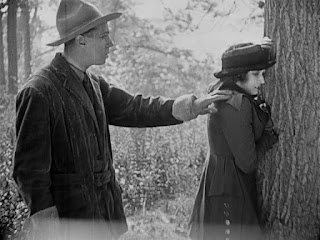Written and Directed by Oscar Micheaux
Starring Iris Hall
USA, 1920
Continuing with the films of Oscar Micheaux, THE SYMBOL OF THE UNCONQUERED is another silent drama that appears to be a direct response to BIRTH OF A NATION. It is similar enough in subject matter that it could have been combined with WITHIN OUR GATES to form one epic. As it stands, the two films in their truncated surviving forms would make a feature length double feature, and should probably be required viewing in any film class that still forces students to watch BIRTH OF A NATION.
This film corrects BIRTH OF A NATION by telling a tale of the Ku Klux Klan that casts them as villains, not heroes. The plot concerns a light-skinned Black woman who travels to the northwest from south when she inherits land. Her dashing new neighbor, a Black prospector who assumes she’s white, befriends her, and the two of them become embroiled in a land battle when the value of their land is revealed to be great, and the Klan is called upon to evict them.
What should be the climax of the movie is actually missing in what survives of this film, and sounds like it was probably the best scene, as it involves the defeat of the Klan at the hands of a Black man with a brick. We see the run up to the Klan attack and the aftermath of their defeat, but are deprived of the climactic victory. Maybe the footage will turn up one day.
This movie, like many of Micheaux’s films and other Race Films, dwells on the concept of light-skinned Black people either passing or not passing as white. Most of these films either have at least a reference to it or at most an entire plot revolving around it. The attitudes of the time about this kind of thing are a little more controversial than something as “simple” as the Klan – it’s easy to see the Klan as evil and their destruction as good. Things get muddier when you have Black characters judging each other for how Black or not Black they are, especially for someone like me who has basically very little knowledge and no experience at all when it comes to these subjects. I know ignorance isn’t an excuse, but it does make it difficult to talk about some of these things, so I think it’s important to at least acknowledge this subject is important to these films, and also acknowledge I’m not sure exactly what to think of that.

No comments:
Post a Comment